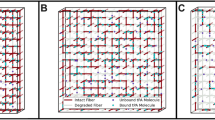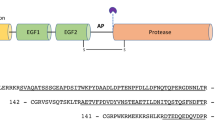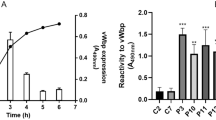Abstract
THROMBIN1 and fibrinogen2 have been shown to exhibit species specificity. Recently attention has been directed to the possible removal of intravascular clots by fibrinolytic agents. Since high concentration of thrombin produces lysis of fibrin3, it was of interest to investigate the effect of homologous and heterologous reagents.
This is a preview of subscription content, access via your institution
Access options
Subscribe to this journal
Receive 51 print issues and online access
$199.00 per year
only $3.90 per issue
Buy this article
- Purchase on Springer Link
- Instant access to full article PDF
Prices may be subject to local taxes which are calculated during checkout
Similar content being viewed by others
References
Nour-Eldin, F., Nature, 196, 782 (1962).
Lorand, L., and Middlebrook, W. R., Science, 118, 515 (1953).
Guest, M. M., and Ware, A. G., Science, 112, 21 (1950). Lorand, L., Physiol. Rev., 34, 742 (1954).
Laki, K., and Mommaerts, W. F. H., Nature, 156, 664 (1945).
Author information
Authors and Affiliations
Rights and permissions
About this article
Cite this article
NOUR-ELDIN, F. Electrophoretic Patterns of Lysed Fibrin formed by Homologous and Heterologous Thrombin. Nature 204, 995–996 (1964). https://doi.org/10.1038/204995b0
Issue Date:
DOI: https://doi.org/10.1038/204995b0
Comments
By submitting a comment you agree to abide by our Terms and Community Guidelines. If you find something abusive or that does not comply with our terms or guidelines please flag it as inappropriate.



